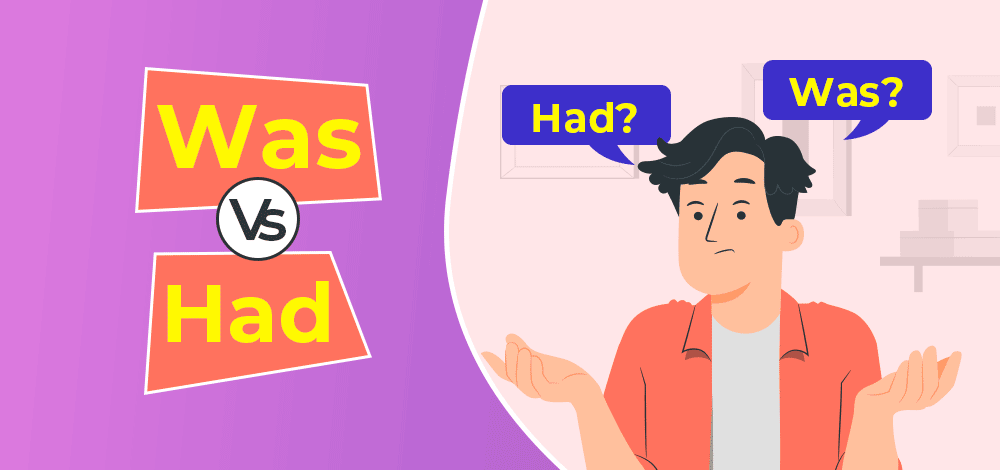Difference Between Was and Had
Last Updated :
02 Aug, 2023
English is the most commonly spoken language in the world and helps in connecting with people across the world. One has to know the basic rules of English grammar to learn the language. In English, we have various auxiliary verbs such as be, do, have, may, might, can, could, must, ought to, etc. The words “was” and “had” are the past forms of the verbs “to be” and “have,” respectively. In this article, we learn about the difference between “was” and “had.”

Difference Between Was and Had
Meaning of “was”
“Was” is the past form of the verb “to be,” which is used only in the case of singular subjects like the first-person singular such as “I” and the third-person singular such as “he, she, and it” and other singular subjects.
Usage of “was”
The word “was” is usually used in the first and third person singular in the indicative mood, i.e., when we speak about something that happened in reality or about known facts. It is used in the past continuous tense and also in the formation of passive sentences.
- Sita was gorgeous in traditional attire. Here, “was” is the past form of the verb “be.”
- Ram was preparing for his final exams. Here, “was” is an auxiliary verb in the past continuous.
- Active voice — Hari made the presentation. Passive voice — The presentation was made by Hari. Here, “was” is used in the formation of a passive sentence.
Examples
- Nimo was a great comedian.
- It was a beautiful and peaceful place.
- It was a great experience to work with you.
- The food was cooked by Nandini.
- I was the first one to come out of the exam hall.
- He was working on his dream project.
- She was crossing the road when a scooter hit her.
- I couldn’t take my eyes off her when she was dancing.
Meaning of “had”
The word “had” is the past form of the verb “have,” which is used with the first, second, and third-person singular and plural subjects.
Usage of “had”
The word “had” can be used in the past tense to indicate possession or ownership of something. It is used as an auxiliary verb in the past perfect and past perfect continuous tenses.
- Khushi had a huge collection of saris. Here, “had” is a verb in the past tense and indicates that Khushi owns a huge collection of saris.
- He had worked hard to reach this position. Here, “had” is an auxiliary verb in the past perfect tense.
- Nikki had been trying to lose weight for a long time. Here, “had” is an auxiliary verb in the past perfect continuous tense.
Examples
- Our house had a water fountain at the entrance.
- The sandwich had a lot of veggies.
- Shipra had finally achieved her dream.
- He had gone to a movie.
- She had worked for an NGO in the past.
- I had to move to London because of my new job.
- We had been planning to go to the Maldives for a long time.
- They had been staying at their grandparents’ house for a week.
Difference between Was and Had
|
Was
|
Had
|
| The word “was” is the past form of the verb “to be,” which is used in the first and third person singular. |
The word “had” is the past form of the verb “have,” which is used with the first, second, and third-person singular and plural subjects. |
| The word “was” is only used with singular subjects. |
The word “had” is used with both singular and plural subjects. |
| It is used in the past continuous tense and also in the formation of passive sentences. |
It is used as an auxiliary verb in the past perfect and past perfect continuous tenses. |
|
Examples:
- I was planning to shift to Mumbai.
- She was watching a movie when we went to visit her.
- Anil was the father of four children, three boys, and one girl.
|
Examples:
- Mike had a beautiful garden in the backyard of his house.
- I had gone to Delhi for an interview.
- He had been studying hard to get a medical seat at the best college.
|
Conclusion
In this article, we have discussed the differences between “was” and “had,” as well as their meaning and usage, with examples. The words “was” and “had” are auxiliary verbs and have different usages and can’t be used interchangeably.
Share your thoughts in the comments
Please Login to comment...